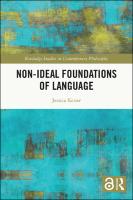Non-Ideal Foundations of Language
Proposal review
Abstract
This book argues that the major traditions in the philosophy of language have mistakenly focused on highly idealized linguistic contexts. Instead, it presents a non-ideal foundational theory of language that contends that the essential function of language is to direct attention for the purpose of achieving diverse social and political goals.
Philosophers of language have focused primarily on highly idealized linguistic contexts in which cooperative agents are working toward the shared goal of gaining information about the world. This approach abstracts away from important issues like power, ideology, social position, and diversity of goals which are crucial to explaining linguistic phenomena both at the semantic and pragmatic levels. This book begins by examining the work of some of the pioneers of this tradition—primarily David Lewis, Paul Grice, and Robert Stalnaker. The author shows that various problems have their source in idealizations made at the foundational level of linguistic theory and proposes to rebuild from the ground-up. She presents a non-ideal foundational theory of language which retains the major insights of traditional frameworks while rejecting the social idealizations that guide them. Then, she explores the social and political applications of her account to issues such as dog whistling, propaganda, racist speech, silencing, and manipulation.
Non-Ideal Foundations of Language will appeal to researchers and advanced students in philosophy of language who are interested in the social and political applications of language, as well as traditional metasemantic theory.
Keywords
Philosophy of language;Social and political philosophyDOI
10.4324/9781003188537ISBN
9781032029979, 9781032036946, 9781000827309, 9781003188537Publisher
Taylor & FrancisPublisher website
https://taylorandfrancis.com/Publication date and place
2023Grantor
Imprint
RoutledgeSeries
Routledge Studies in Contemporary Philosophy,Classification
Philosophy of language
Social and political philosophy


 Download
Download Web Shop
Web Shop